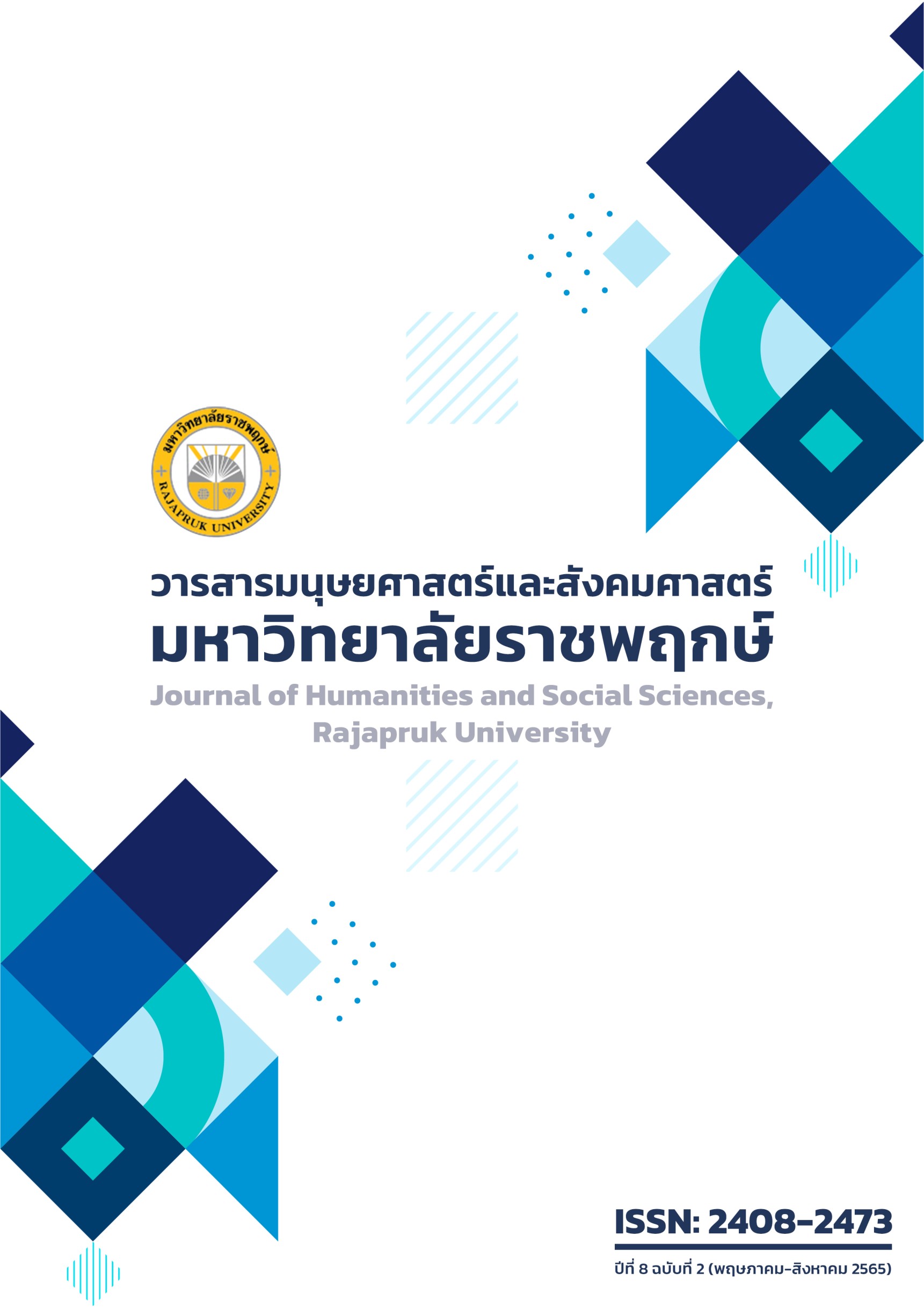The Priority Needs of Developing Academic Management in Secondary Schools under the Secondary Ed
Main Article Content
Abstract
This research aims to study the current and desirable states and assess the priority needs of Developing Academic Management in Secondary Schools under the Secondary Educational Service Area Office Bangkok 1 based on the Concept Growth Mindset. Information contributors were 285 personnel, including school directors, deputy directors, and teachers in the school of Group 5 under the Secondary Educational Service Area Office Bangkok 1. The research instrument was a questionnaire that had an index of item objective congruence (IOC) of 0.67-1.00. The data were analyzed by mean, standard deviation and priority needs index modified (PNImodified). The results found that the overall current and desirable of Developing Academic Management in Secondary Schools under the Secondary Educational Service Area Office Bangkok 1 based on the Concept Growth Mindset were at the medium level ( =3.548) and the highest level ( =4.690), respectively. The first priority needs was curriculum development (PNImodified=0.321) followed by instructional management (PNImodified=0.312) and measurement and evaluation (PNImodified=0.307), respectively.
Article Details
References
กฎกระทรวง กําหนดหลักเกณฑ์และวิธีการกระจายอํานาจการบริหารและการจัดการศึกษา พ.ศ.2550, (2550, 16 พฤษภาคม 2560). ราชกิจจานุเบกษา. เล่มที่ 124 ตอนที่ 24 ก, หน้า 29-30.
กิติมา ปรีดีดิลก. (2532). การบริหารและการนิเทศการศึกษาการศึกษาเบื้องต้น. กรุงเทพฯ: อักษราพิพัฒน์.
เครือข่ายนักประชาสัมพันธ์ สพม.1. (2563). สพม.1 ประชุมรองผู้อำนวยการกลุ่มบริหารวิชาการ และหัวหน้างานหลักสูตรสถานศึกษา กลุ่มโรงเรียนที่ 5. คนเมื่อวันที่ 5 พฤษภาคม 2564, จาก https://www.facebook.com/media/set/?set=oa.2884964778281342&type=3
ฆนัท ธาตุทอง. (2550). การพัฒนาหลักสูตรท้องถิ่น. นครปฐม: เพชรเกษมการพิมพ์.
จรุณี เก้าเอี้ยน. (2556). เทคนิคการบริหารงานวิชาการในสถานศึกษา: กลยุทธ์และแนวทางการปฏิบัติสำหรับผู้บริหารมืออาชีพ. สงขลา: ชานเมืองการพิมพ์.
จามจุรี จำเมือง. (2552). คู่มือเตรียมสอบผู้บริหารสถานศึกษาและผู้บริหารการศึกษา. กรุงเทพฯ: เจริญดีมั่นคง.
บุญเลี้ยง ทุมทอง. (2544). การพัฒนาหลักสูตร. กรุงเทพฯ: สำนักพิมพ์แห่งจุฬาลงกรณ์มหาวิทยาลัย.
ปรียาพร วงศ์อนุตรโรจน์. (2553). การบริหารงานวิชาการ. กรุงเทพฯ: ศูนย์สื่อเสริมกรุงเทพ.
พระราชบัญญัติการศึกษาแห่งชาติ พ.ศ.2542. (2542, 19 สิงหาคม). ราชกิจจานุเบกษา. เล่มที่ 116ตอนที่ 74 ก, หน้า 3.
ภัทรพร กังวานพรชัย. (2559). ความสัมพันธ์ระหว่างการควบคุมในงานและความพึงพอใจในงานโดยมีรูปแบบการเผชิญปัญหาเป็นตัวแปรส่งผ่านและกรอบความคิดแบบยึดติด-เติบโตเป็นตัวแปรกำกับ. วิทยานิพนธ์ศิลปศาสตรมหาบัณฑิต สาขาวิชาจิตวิทยา คณะจิตวิทยา จุฬาลงกรณ์มหาวิทยาลัย.
ยามีละห์ เจ๊ะซอ. (2560). การบริหารงานวิชาการในสถานศึกษาขั้นพื้นฐาน สังกัดสำนักงานเขตพื้นที่การศึกษาประถมศึกษาปัตตานี เขต 3 วิทยานิพนธ์ครุศาสตรมหาบัณฑิต สาขาวิชาการบริหารการศึกษา มหาวิทยาลัยราชภัฏยะลา.
รุ่งชัชดาพร เวหะชาติ. (2550). การบริหารงานวิชาการสถานศึกษาขั้นพื้นฐาน. สงขลา: ศูนย์หนังสือมหาวิทยาลัยทักษิณ.
ศูนย์จิตวิทยาการศึกษา. (2558). Mindset กรอบความคิด. กรุงเทพฯ: ศูนย์จิตวิทยาการศึกษา มูลนิธิยวสถิรคุณ.
สำนักงานรับรองมาตรฐานและประเมินคุณภาพการศึกษา (องค์การมหาชน). (ม.ป.ป.). ผลการประเมินคุณภาพภายนอก. คนเมื่อวันที่ 1 เมษายน 2564, จาก http://aqa.onesqa.or.th/SummaryReport.aspx
สำนักงานเลขาธิการสภาการศึกษา. (2560). แผนการศึกษาแห่งชาติ พ.ศ.2560-2579. กรุงเทพฯ: พริกหวานกราฟฟิก.
สำนักวิชาการและมาตรฐานการศึกษา. (2557). แนวปฏิบัติการวัดและประเมินผลการเรียนรู้ตามหลักสูตรแกนกลางการศึกษาขั้นพื้นฐาน พุทธศักราช 2551. กรุงเทพฯ: ชุมนุมสหกรณ์การเกษตรแห่งประเทศไทย.
สุรศักดิ์ ศิริ. (2550). รายงานการศึกษาการพัฒนาหลักสูตรสถานศึกษา. กรุงเทพฯ: ธารอักษร.
สุวิมล ว่องวาณิช. (2558). การวิจัยประเมินความต้องการจำเป็น. กรุงเทพฯ: องค์การค้าของ สกสค.
อรรถชัย ศรีวรภัทร. (2563). แนวทางการพัฒนาผู้บริหารโรงเรียนสังกัดสำนักงานเขตพื้นที่การศึกษาประถมศึกษากระบี่ ตามกรอบความคิดแบบเติบโต. วารสารการบริหารและนวัตกรรมการศึกษา, 3(3): 40-63.
Blackwell, L.A., Trzesniewski, K.H., & Dweck, C. S. (2007). Theories of intelligence and achievement across the junior high school transition: A longitudinal study and an intervention. Child Development, 78(1): 246-263.
Conbach, L. Joseph. (1984). Essential of Psychology and Education. New York: Mc–Graw Hill.
Dweck, C. S. (2006). Mindset: The new psychology of success. New York: Random House.
Illinois Center for School Improvement. (2016). Habits of Mind - Developing a Growth Mindset. Retrieved on March 20th, 2021 from https://revivingschools.org/wp.../Learning-Snapshot-Developing-a-Growth-Mindset.pdf
Krejcie, R. V. & Morgan, D. W. (1970). Determining sample size for research activities. Education and Psychological Measurement. 30(3): 607-610.
Lee, Y.H., et al. (2012). Gaming Mindset: Implicit Theories in Serious Game Learning. Cyberpsychology, Behavior, and Social Networking, 15(4): 190-194.
Nussbaum, A.D. and Dweck, C.S. (2008). Defensiveness Versus Remediation: Self Theories and Modes of Self-esteem Maintenance. Personality and Social Psychology Bulletin, 34(5): 599-612.
Swann, W., & Snyder, M. (1980). On translating beliefs into action: Theories of ability and their application in an instructional setting. Journal of Personality and Social Psychology, 38(6): 879-888.


